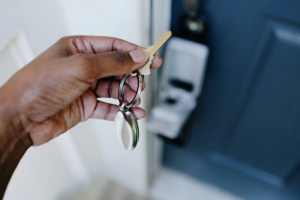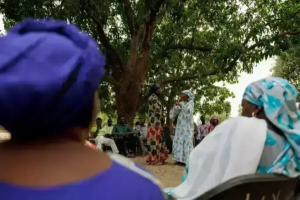Aboriginal and Torres Strait Islander readers are warned that this article contains the name of a deceased person.
Scott Wilson grew up obsessed with superheroes, but he never saw his own culture in the comic books he’d get lost in.
“When I was a kid, my favourite superhero was Wonder Woman. I’d twist a bath towel into a lasso and pretend it was the Lasso of Truth,” he says.
Scott grew up in Rubibi (Broome), spending his time on country around the Western Australian tourist town.
Spider-Man was the superhero who really captured his imagination, and he identified with the idea of a high school student by day, masked avenger by night.
But like most superheroes, without his mask, Spider-Man is a white man.
For Scott, it raised a very personal question: Why don’t I ever see myself in these stories?
As he grew up and learned to make his own superheroes, Scott found the answer in creating comics that draw from the world’s oldest living culture, and by sketching its newest figures.
He called it the Indigiverse. In this universe, the superheroes talk in traditional language, and draw their power from the Dreaming.
And Scott has big plans for his superheroes.
Living in the ‘Bronx of Broome’
Scott grew up on Djugun-Yawuru Country, living in an area he says was known as the ‘Bronx of Broome’.
“We lived on Anne Street and it had notoriously been given the name ‘Diamond Street’. All the shattered glass on the road would shine as if it was a diamond,” Scott explains.
Scott grew up in Rubibi, in the Kimberley region of Western Australia. (Supplied: Scott Wilson)normal
His role models were the people around him. He was raised on the stories that his mum and dad used to share about his grandfather and his other relatives.
“They were tough, rugged human beings. But they had this class, this embodiment of heroes … They were on horseback, droving cattle across rough terrain in the Kimberley and on country through croc-infested waters.
“It just set up who I wanted to be,” Scott says.
Scott grew up riding horses and reading comic books. (Supplied: Scott Wilson)normal
Although he was raised on these yarns, and he wanted to be part of that world, he wasn’t really the adventurous type. Instead he enjoyed other pursuits.
“The space that I found most me was being alone, drawing,” Scott explains.
Drawing was about creating a world he could make his own.
Scott poured himself into his illustrations and his school work, eager to prove himself.
That hard work earned him a scholarship to Perth’s prestigious Hale School, WA’s oldest private boys’ school. It was around 22 hours drive from his hometown; a long way from the Bronx of Broome.
“It was like we were heading to Hogwarts. I had no idea what I was getting myself into,” Scott says.
Being there was a once-in-a-lifetime opportunity, but Scott was one of only a few Indigenous boys at the boarding school.
He described himself as a “shapeshifter”. Chess, rugby, basketball, art — he did everything, wanting to excel and be the best.
But it couldn’t shield him from the prejudice he was confronted with whenever he did things like going to the local shops.
Scott grew up loving sport and a variety of other pursuits, but it was drawing that most captured his interest. (Supplied: Scott Wilson)normal
“[Shop staff] would check your bag … [and] I thought, Oh, that’s probably just how they do it with all kids. But I noticed they weren’t checking any of the other non-Indigenous students’ bags,” Scott says.
“I just was very blasé to these concepts of racism. I never really thought of myself as Aboriginal [when I was in Rubibi] because I was in my class with majority Aboriginal students and we didn’t say, ‘Hey, I’m Aboriginal.’ We’d just say, ‘Oh, I’m Gooniyandi’. You know who your mob is.
“It wasn’t until people started pointing out … ‘Hey, they’re only doing that because you guys are black’.”
As he was learning to deal with these concepts of racism, and finding his voice as a young creative, a tragedy struck that shaped his art forever.
Dealing with loss
While boarding at Hale, Scott lost a beloved cousin, Adam, in a car crash.
The sudden death rocked him.
“Adam was my big brother, basically, and he loved his cars. He had this brilliant, beautiful gold car. The golden boy,” Scott says.
“[He] used to drive around town. You know, all the girls used to sing out. Everyone knew him.”
Adam’s passing compounded the sadness of the deaths Scott had already lived through. Many of them were to suicide.
“I started to get this understanding or this feeling that I was going to die,” he says. “That I was not going to survive or get to 21. I had this responsibility to my family, to my community, and to the rest of the world.
“My mum and dad were working their arse off for me to do these things. I wanted to go and explore any opportunity that I got because I wasn’t doing it just for me.”
With the tragedy of his cousin’s life as a reminder, Scott doubled down in his school work at Hale.
Scott wants to convey his values and community through his comic writing. (Supplied: Scott Wilson)normal
And he found the ideal elective: Create Your Own Superhero. He already had the model for his superhero in mind, a Gooniyandi man named Adam Hart.
“A lot of the characters that I was forming had that anti-hero vibe,” Scott says.
“I created this character that was just completely Black with all these awesome colours throughout the body, with the power to move through time, move through space. I love this idea of, no matter what the challenges … they’ll overcome their own darkness within themselves.”
Expanding the Indigiverse
In 2010, Scott finished high school and went to the University of Western Australia.
He was an anthropology major by day, comic creator by night. And when he was not in a lecture, he was building a whole universe of First Nations superheroes, dubbed the Indigiverse.
Adam Hart was at the centre, but over time, Scott created a world in which Adam is displaced from his own culture, and dropped him on the other side of Australia, on Gadigal land.
He also gifted him a superpower, which came from the power of the Dreaming.
“I had to be very specific. It had to have our First Nations language connection to my people, connection to the country, all those connections. The universe has given me this story. Or given me the tools to bring what is given to me to life.”
Scott’s Dark Heart series follows an Indigenous superhero and draws on his knowledge of First Nations culture and language. (Supplied: Scott Wilson)normal
“I started writing and actually putting this idea that’s been in my head down on paper. It’s about where we come from and where we’re going. It grew its own little ecosystem of characters, of storylines. Past, present and future has always been within that.”
He mapped out every inch of the Indigiverse, creating planets and people, galactic quadrants facing cosmic darkness. And he created a comic series named Dark Heart.
Eventually he realised he could no longer be a one-man gang. He needed illustrators, publishers and investors. So he presented his ideas for Dark Heart at comic conventions throughout Australia.
The journey to writing comics took Scott from his home in Djugun-Yawuru Country to Perth. (Supplied: Scott Wilson)normal
He received lots of positive feedback, but when he presented the idea to a fellow Indigenous comic creator, who had already made a name for himself, Scott got an unexpected response.
“It cannot work,” Scott was told, because there are already Marvel and DC superheroes. And, the person said: “People do not want an Aboriginal superhero universe.”
But not even this knockback would throw him off his path.
Getting his big break
While Scott continued to pour everything into the Indigiverse, he remained a superhero fan.
So when Stan Lee, the creator of Spider-Man, was announced to appear at Brisbane Comic-Con in 2017, Scott knew he needed to be there.
“This was a once-in-a-lifetime opportunity,” he says. “And so I threw all my money in. I had to buy the VIP ticket.”
He took along some treasures from his collection, and had them signed by Stan Lee.
More importantly, he made an invaluable connection at Comic-Con — he met the founder of one of Australia’s leading comic publishing houses.
This time, his pitch was a success. Through this new connection, he was linked up with the other creators who would help bring the Indigiverse to life and put Dark Heart in comic book stores around the world.
Scott was eventually linked with other creatives to tell Indigenous stories in comics. (Supplied: Scott Wilson)normal
Six years on, the Indigiverse is still expanding.
With his collaborator and co-founder, Benny Eggmolesse, Scott has big plans for Dark Heart, including an animated series, figurines and a movie.
He even dreams of comic book universes filled with Māori and Pasifika demigods.
Yet for now, Scott remains separated from country. His life in Boorloo (Perth) is a world away from his people in Rubibi; something he’s still making peace with.
“Young people can still be connected to culture, even if they’re living in the city,” he says.
“Every part of Australia is First Nations country, regardless if there’s concrete on the ground, if there’s skyscrapers.”
The Dark Heart comic universe has expanded in the years since Scott Wilson started working on it.(Supplied: Scott Wilson)normal
And by creating a First Nations superhero universe, he says he is moulding the living, breathing embodiment of what always was, always will be.
“My niece and nephews will grow up seeing their language and their names and their family’s names,” Scott says.
“Resilience, persistence, but also our value to protect our land, our peoples, and our community conveyed through this comic.”




